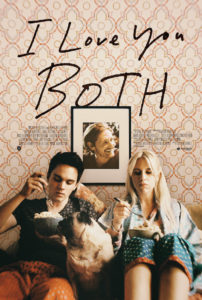 The new indie dramedy I LOVE YOU BOTH centers on codependent twins Krystal (co-writer KRISTIN ARCHIBALD) and Donny (director/co-writer DOUG ARCHIBALD). While each sibling is navigating their own quarter-life crisis, they both end up falling for the same guy, a laid-back art teacher named Andy (Lucas Neff).
The new indie dramedy I LOVE YOU BOTH centers on codependent twins Krystal (co-writer KRISTIN ARCHIBALD) and Donny (director/co-writer DOUG ARCHIBALD). While each sibling is navigating their own quarter-life crisis, they both end up falling for the same guy, a laid-back art teacher named Andy (Lucas Neff).
As their shared last name might suggest, Doug and Kristin Archibald are more than just collaborators and co-stars; they’re brother and sister. And I Love You Both marks not only the acting debut for the Missouri-born siblings, but also their first produced (and first written!) screenplay, and Doug’s first feature film as director.
A successful Indiegogo campaign got the project off the ground, and musician/YouTube superstar Connor Franta eventually signed on as Executive Producer. The film was picked up for distribution by Magnolia Pictures, who will release I Love You Both in theaters, On Demand, and on Amazon Video and iTunes on June 9. [UPDATE: The film is now available to stream on Hoopla, Vudu, and Tubi.]
We had a chance to talk with writer/actor Kristin Archibald and writer/director/actor Doug Archibald about making the film, including their collaboration process, the value of making a proof-of-concept pitch trailer, and giving their own mother her big acting break.
——
COLIN McCORMACK: Growing up, were you guys the “get the camcorder from your parents, make movies in the backyard” type of kids?
DOUG ARCHIBALD: Literally just that.
KRISTIN ARCHIBALD: Yeah.
DA: We made – this was when Survivor was really big, but at that time I was a pianist heavily [involved in] child piano competitions – and then I would spend all my money from that on camcorders, and I did a full season of Survivor with all of my middle school friends.
KA: Yeah, it was Survivor: The Outbackyard. And then he spent like three years editing those.
DA: Never to film a last episode because– we just didn’t, I don’t know why.
CM: Productions fall through all the time, at every level.
DA: Yeah, it fell through. Our budget fell through. [Laughs]
CM: Was I Love You Both the first screenplay that you two collaborated on together as a formal filmmaking exercise?
DA: Formal and unformal. Informal. Unformal’s not a word.
KA: The first of its kind.
DA: Ever.
CM: What spurred the idea? What made you decide, Now is the time, let’s do this?
DA: I don’t know if it was such a concrete decision. It evolved over time. We’ve always worked together, we’ve always supported each other in our individual projects, and it was only inevitable that we would eventually make a movie together.
KA: I feel like there was somehow a two-week period where we were talking about writing a web series. And then it was like two weeks later, we [decided], Let’s just write a feature.
DA: Actually, I think it did start with a feature. We were outlining something– a very early incarnation of this was just these two codependent twins. It was just that, except it was more about them surviving as young people and codependents. And it became more about their relationship over a long period of working on it and refining it. It’s really about their codependency. The story is about them becoming individual people, but they share everything. So you’re going to have to give them something that they can’t share, which is a boyfriend. Then we remembered that we also had a crush on the same guy at one point for like a day. But we [thought], What if that went on for way too long? That’s how the story came about.
CM: As you were writing the characters, was the plan always to star as them?
KA: No. We started writing and then firstly we wanted to test the story so we did a pitch trailer just to make sure that the story was funny. Doug was going to UCLA – we’re originally from St. Louis – so it was over winter break, he came back to St. Louis and in thirty-degree weather in our parents’ backyard again – but with some better rental equipment this time than Survivor.
DA: Yeah, a little better than a DV camcorder. A little more production experience. A lot more. [Laughs]
KA: So we shot the pitch trailer and not only were we like, This is a funny story, but we showed it to who we were considering to be our producer at the time [Ryan Finnerty] – who ended up producing it – and he was like, “It is funny. But you guys have to be these characters. ‘Cause it’s actually funnier with you as these characters.” So we ended up not only casting ourselves, but we used that same pitch trailer on our Indiegogo to help fund it.
CM: Did you ever face the opposite reaction from potential financiers: We need two known actors? ‘Cause it’s pretty awesome that your producer was like, “You guys need to star in this.”
KA: We didn’t, but we also used the Indiegogo crowdfunding first as a proof of concept that there was interest in this movie.
DA: It kind of all happened at once. I think it was just a testament to the pitch trailer being well-done, and it was just two-and-a-half minutes but we spent a lot of time on it. But we did as best as we could to make it look like a real movie so that someone would watch it and say, “I would literally go to the theater tomorrow and watch this if it were a real movie.” So I don’t think there ever really was a time where people were like, I would invest if you got [stars]. I don’t even know if we had the luxury of getting to the point where we had all these producers [vying]. It was very much navigating small steps along the way with friends that we know who believed in us. I don’t think we were ever even at the level of being able to go out to people like that.
CM: How did you determine what was a realistic goal for the crowdfunding campaign?
DA: I studied a little bit of producing at UCLA. I took a grad producing class that they allowed some undergrads to take, which ended up being really informative for me about how to make a budget for a feature and scheduling and everything. And after UCLA I produced [Ryan Finnerty’s] feature, who’s also a writer. And that was like twice the budget of our movie, so that was a great way of putting what I learned to use–
KA: Test it on someone else’s movie first. [Laughs]
DA: [Laughs] Yeah.
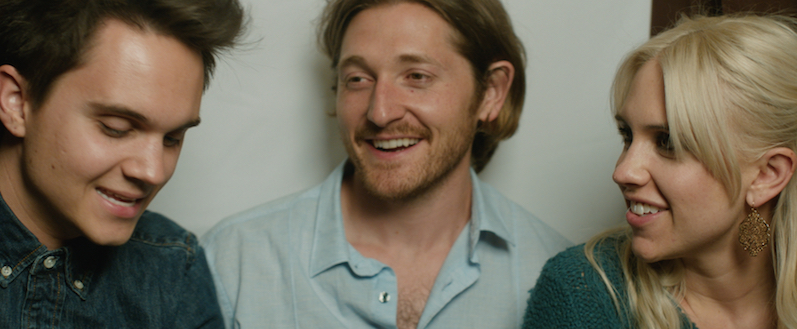
CM: How did you end up casting Lucas Neff? It seems like a difficult role ’cause he’s sort of the ultimate cool guy, but he still feels realistic. You don’t want him to be too ideal, you want it to be grounded.
KA: We auditioned a lot of people, and we also had a couple of friends working in casting who gave us a lot of suggestions, not just for Lucas but for a lot of the characters. And we’d already seen some of his stuff. Since we already knew our humor, we wanted someone that really fit the same vibe and was very natural.
DA: I think Kristin thought of Lucas and then he did actually come in and audition for us, which was really nice of him. We had seen another person at a Lucas “level,” I guess you could say, and then some people who were great, but it just ended up not mattering because we loved Lucas for every reason. It just made sense.
KA: For every reason, not just acting. We actually followed him on Twitter and stuff, and we knew that we were making a somewhat LGBT movie, and we knew that these were also things that he cared about. And obviously his performance was outstanding.
DA: By that point we knew it was a very naturalistic performance-type of movie. We hadn’t even cast our real mom yet, but we knew the dynamic that people liked in the pitch trailer – again, going back to that – was just the, They’re real siblings, they’re natural together. And what we did in [Lucas’s] audition was funny and it ended up being kind of genius. Kristin couldn’t be there, she was out of town, so I ended up doing her date scene with Andy in the audition with Lucas. And it was really funny because it’s like, Well this is perfect. It’s not even me doing this scene, it’s Krystal, but it still works and he was natural with me too. And it just seemed like a perfect fit. And we were lucky enough that he was available and wanted to do it.
KA: He was barely available.
DA: Barely available! There was a day when we were sitting on Kristin’s balcony–
KA: Having a meltdown.
DA: Because our cinematographer also dropped out two weeks before and we had to find someone else – which actually was a blessing in disguise as it turned out because our cinematographer Aaron [Kovalchik] is amazing – and also Lucas’s schedule was falling through and it was like, Oh my God! We don’t have Andy! We don’t have a cameraperson!
KA: We were calling [Lucas’s] reps a couple times a day every day for two weeks just to be like, We just need him, we don’t care when it is, we’ll move the whole thing, we just have to have him!
DA: Yeah, the whole schedule was arranged around him. We did have to switch everything, and then Artemis [Pebdani, who plays Krystal’s friend and co-worker] was out of town. I mean, we were just so lucky to be working with people who cared about the project. Because Artemis came home from a vacation.
KA: Yeah, she did.
DA: She drove home from Palm Springs or something early to do her two days.
KA: Yeah. So that’s the longest answer ever on how we cast Lucas. [Laughs]
CM: How many days did you guys shoot?
DA: Sixteen days.
CM: Wow. And when did your mom get cast? ‘Cause she is a scene-stealer, which I’m sure you’ve heard before.
KA: Like a week before as well.
DA: In the middle of production. We didn’t have the budget for a casting director. Like Kristin said, it was friends sending us names and me being like, “Okay, yes, okay, yep,” and casting them. But the mom–
KA: The mom was the hardest part.
DA: It was really hard to find that character. The hardest one. And we auditioned people and were like, They’re good, but they’re not our mom. It’s not working. Again, the natural thing– it’s almost harder to fit into this vibe that we have going. So then Kristin said, “We have to cast Mom.” And I was like, “I don’t know, man.” Because we happen to be funny, I guess, on-camera. People like that. But what if Mom is just really weird? [Laughs]
KA: When we were auditioning the mom, I don’t know what was going on. I mean, we got a lot of interesting people coming in. One person was like drunk and falling down–
DA: We’re not talking about that. [Laughs]
CM: No names! Your mom is so natural, though. It’s just one of those happy accidents, like your DP. You think it’s a disaster that you can’t find an actress to play the mom.
DA: Yeah, it ended up being so ironic.
KA: It’s everyone’s favorite character.
DA: Some critic at a film festival wrote a review and was like, “By far the best acting in I Love You Both is Charlene Archibald.” I was like, My mom. Who’s a nurse. Cool. Who was almost never in it. But she is the best. The first couple takes, she was “acting,” and I was like, I have no idea who this person is. This is weird. She was [projecting across the room], “Hellooo!” I [said], “You’ve said all of these things before.” ‘Cause it is based on her. So it’s like, “Just tell the story again.” And that’s when she was just like, “Okay,” and then quickly had to also get over her fear of bumping into the camera.
KA: Yeah, I don’t know what that was about.
DA: I don’t know why she was concerned about that.
CM: They don’t teach blocking in nursing school.
DA: [Laughs] She was really fun.
CM: And the house that is the set for the [twins’] house is such an awesome location. How did get that?
DA: That’s my house.
CM: Well that’s easy.
KA: It’s not as nice as it looks. [Laughs] Just kidding!
DA: I live there with my boyfriend and we’ve lived there for four or five years. I’d always thought about shooting there, but I wasn’t sure. It’s very small, it looks a lot bigger in the movie. But then the movie The Gambler was shot there while we were living there. They came in and did it so I was like, Well why can’t we do it? Then I realized it’s actually another miracle. It’s the perfect location. It’s a treehouse! For codependent kids–
CM: It’s a historical case study house, right?
DA: It is. It’s a Rodney Walker mid-century modern treehouse.
KA: And it worked out in so many ways because of that. It was more private. We had all the trucks pulled up there and everything. [Laughs] Also, it doesn’t look obviously like LA, which was nice because that’s not part of it. The story’s not location-specific.
DA: Yeah, we wanted it to be able to take place anywhere. So that really worked out. People [ask], “You shot in Portland, right?”
KA: We also got to sleep on set every day.
DA: Yeah, we just woke up, opened our eyes, and–
KA: We were on set.
CM: Was there ever a moment when you were like, I need everyone out of my house?
DA: Never.
KA: No, no. His boyfriend, maybe.
DA: My boyfriend freaked out.
KA: One day his boyfriend just came home with a brand-new vacuum. [Laughs] He was so stressed out!
DA: The couch was on the lawn and he was really freaked out and I felt bad about that. He was like, “The couch isn’t going to be on the lawn, is it?” I’m like, “Oh, no! No, no, no!” He came home; the couch was on the lawn. [Laughs]
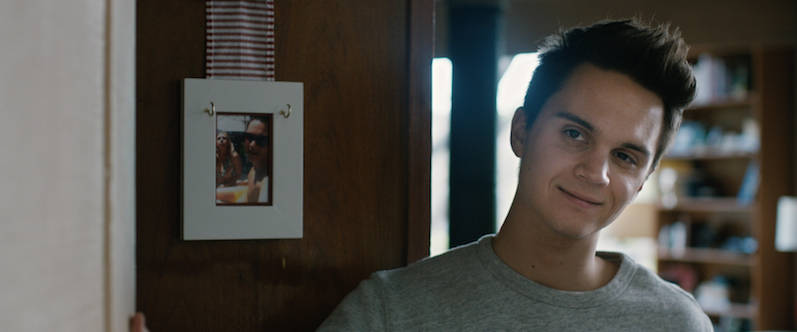
CM: How did Connor Franta come on board as Executive Producer? He’s got a huge following, so I assume you can get some of those followers to see the movie?
DA: Just another stroke of luck. He is repped by CAA, who was our sales agent through our producer, who is repped by CAA too. It was just a magical stars-aligned thing.
KA: He’d done another film before.
DA: Gayby Baby.
KA: Yeah, he’d done that and he was already looking for a project. He does a lot of different things; they recently launched their Heard Well radio station, they’re doing their Common Culture [retail brand], and he’s really into doing compilations and music choices and stuff. He’s really into the creative.
DA: We liked his ideas for the movie. It was just a really magical fit and he’s a great person and easy and fun to work with. He just elevated the movie with music suggestions.
KA: And the other creative. He was definitely instrumental. Especially when we wanted to make a lot of choices regarding the trailer, and we had to do all these different cuts for social media links and that’s his expertise, social media. So it was fun that he knew what would [work].
DA: I think we have similar sensibilities, and that’s why it worked out really well.
CM: The music is really great in the film. Were you hands-on from the get-go, or did Connor help bring that element? Was music always going to be such as big a part in your mind as it ended up being?
DA: The music was one of the hardest parts because we didn’t have a music budget. I think maybe only one of the songs in the movie we were able to license. We came to Connor at the end of locking the movie and we still had to replace some songs. So most of it was music that Kristin and I had procured just through friends and friends of friends. We listened to thousands of songs and they were great, but they don’t [all] work.
KA: [Connor] was happy with a lot of the music we were luckily already able to get for free, mostly. But his expertise and his creative definitely came on-board when it was time to do all of the music for all of the advertising we’ve done. All of the trailers, and then all of the font, titles, that type of stuff.
DA: He did the music for the trailer, which really we feel encapsulated the movie.
KA: We’ve had so many messages and comments, What’s the song in this trailer? So he obviously found the perfect fit for that.
DA: He suggested maybe five songs or something and that one was like, Wow. We couldn’t have found a better song that encapsulated our movie. He’s awesome.
CM: Did you anticipate having such a hands-on role in the marketing aspects? Was there a thought that when a distributor comes on-board, they’ll handle that and they’ll cut us out? Did you want to be involved?
KA: I personally thought– Magnolia is our dream distributor. And that was towards the end of our festival circuit. So up until Magnolia [acquired the film], I was imagining that we would be very hands-on. So this has been better than anything I ever dreamed. Magnolia does so much. They’ll just start posting each week– a countdown– they do everything!
DA: It’s been a dream to wake up to, Oh wow they did this awesome video. Or taking over our social media.
KA: They’ve asked us our feedback and they give us so many choices. They care about our opinion on it so they’re not just running away with things. But then they’ve handled everything. They’re the most organized, they’re amazing. They go above and beyond.
DA: I don’t have an alternate perspective because this is our first time, but all I can say is that they’ve been amazing. I think I can say in general along the way, each step has been more work than I imagined [laughs]. But it’s fine. It’s our first movie, so why wouldn’t you just give it everything you have? That’s the whole point.
CM: What was the biggest learning curve on the acting side as well as the writing or the directing side?
KA: For me, I’d never acted before. My first day of acting was Day One [of the shoot].
DA: Same for me.
KA: I don’t feel changed by it, honestly. But that’s hard to say because we’re also talking about over four years of doing table reads.
DA: It’s a little bit of a different experience than an actor being sent a script and cast in something and having a month to get it sounding natural. And the characters were loosely based on us. Although at this point they don’t feel like us.
KA: Oh, no. [Laughs]
DA: Because we’ve changed so much. But at the time of writing it and even at the time of acting in it, I didn’t so much relate to the character anymore. The main character is really naïve, so I think that was mabye the only choice I was making was to make him seem a little more like a doormat, a little quieter. I don’t know, for acting I think the [learning curve] is Don’t look at the camera? [Laughs]
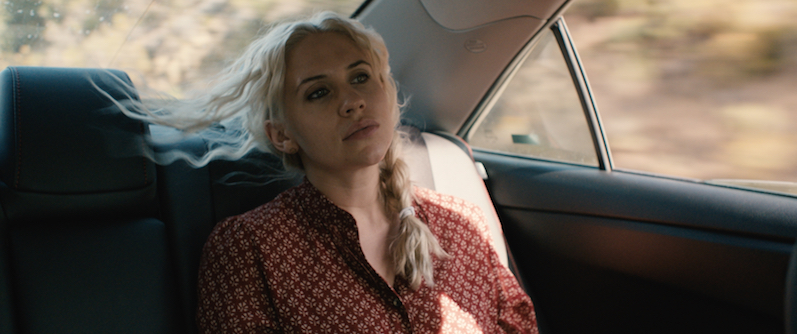
CM: Did you learn anything from Artemis or Angela Trimbur or these people who have done a lot of comedy work and on-camera acting?
KA: Well that’s interesting just because they make all of their own choices. And they’re so good! Especially as writers, when you’ve been reading it for so long and you see the choices they make, their interpretation of the character, it’s really fun just to watch. The sky’s the limit with them. When Artemis is doing the roundhouse kick and stuff, all of the choices she was making on that is so funny and great.
DA: Angela would do just a series. She’s like, “I’m going to do a series,” and would do ten hilarious things in a row. I was editing that scene in the office and it was so long. [Laughs] And then Kate Berlant, who is like the most amazing improviser.
KA: The funniest person.
DA: She gave so much stuff that it was overwhelming. Which is maybe why the first rough cut was two hours and no one laughed the entire time. Because it was overwhelming material. And for writing, since it was our first thing, we made so many mistakes.
KA: We’ve really changed our writing process since then.
DA: We’re faster and we’re better and we know what works now.
CM: Are you guys an in-the-room-together, working-at-the-same-time type of writing partners?
KA: Totally. Twenty-four-seven.
DA: Ninety-percent of the time we’re together. But we’re heavy outliners.
KA: Thank God.
DA: I think that’s what most people do – I would highly recommend it – but I guess someone can sit down and write beginning to end. That’s what we tried to do with our movie.
KA: That’s what we started doing.
DA: Like, We want it to be natural, so let’s just decide what happens next. No! No! Not for us. [Laughs] Especially with two people, when we’re both, Hmm, I don’t know what’s next, and nothing gets done. Now we really heavily outline. By the time we’re writing dialogue, it’s almost done. And at that point we’re just trying to come up with the best thing to say because we know exactly what we want the scene to be.
KA: I think the best part is – and we don’t do this anymore because this was insane – there was a year-and-a-half period where we would both separately write every single scene, then we would read them and decide which one’s should be used.
DA: It was horrible. Never do that.
KA: It’s a horrible feeling, especially because there could be weeks that go by and everything that you have written is never used. Just thrown in the trash [laughs].
DA: That’s an extreme. And the other extreme is not telling the person that something is bad, and putting it in. But somehow we’ve gotten to a different level where we can actively and aggressively discuss the best thing without our emotions being involved. We go back to, What is the point of this scene? We’ll bring up things like, That’s hilarious, that’s a really funny line but I’m worried that’s not the point. It’s so boring and logical, actually, the way that you have to do it.
KA: I feel like we both do everything and it’s very balanced. But [with a] 20,000 feet view, Doug has always slightly more so kept everything very relevant to the story, and I probably will come up with ten completely off-the-wall ideas. One of them is great, the other nine are funny and Doug is like, “But that has nothing to do with the story.” [Laughs]
CM: The “kill your darlings” cliché. I love this joke, but it doesn’t fit so it’s gotta go.
DA: That happens all the time, that’s true. The one thing that’s been the same the whole time is that when something’s good, we both say “That’s it” at the same time. “That’s good.” And those things generally stay ‘til the end. Longest answer ever. Was I supposed to talk about directing? [Laughs]
CM: Did that happen also on the directing side? When you just know? You’re both aware when it’s a good take so [Doug] knows, We can move along, and [Kristin] knows, I just delivered in that scene?
DA: Well, it was mostly up to me in that case because I was directing it. Kristin luckily was just trusting me.
KA: Yeah, I felt good about that.
DA: Maybe there were a couple times where [she] would say, “I want to do that again,” but Kristin really trusted me and she luckily was always open to doing something. I know it can be weird when you’re asked to do something, like I’m telling you “It looks good, just do this.” But Kristin was really open. Also, she was surprising me with all of this stuff we’d never talked about that just happened in the moment. For me that was really fulfilling.
CM: What were the learning curves on the directing side? You’d directed shorts before, but this is your first feature.
KA: I can tell him something for you, probably.
DA: Okay.
KA: On the short you probably had to make less changes or decisions on the spot, especially because your short was [filmed] on a soundstage.
DA: Yeah. I think with a feature, it’s such a massive amount of work to give yourself the time you need. At this level, everyone’s a producer. But you really need to surround yourself with people who will take on that producing when you need to sit down and storyboard or shot-list or whatever you need to do. Or make sure you’re having enough time to go to the locations and nail down your shots. On this movie, sometimes it was so by-the-seat-of-our-pants because of rapidly changing schedules, and that really can take a toll obviously on how the scene ends up. You always have to roll with the punches, but on the next thing I really would want to be more laser-focused from the beginning and just hope that I have the prep time that I need as a director.
And I don’t know if there’s really any excuse. Just start doing it. When the script is done and you know you’re directing it – even if you don’t have your budget – just start. Even if you don’t have your locations, storyboard. Figure it out. ‘Cause as soon as you start pre-production on a low-budget [project] and you’re a producer and a director, your time is going to be spent producing. Because you can be storyboarding, but if you’re not going to produce it too it’s not going even to happen [laughs]. It’s a massive amount of work, and it’s always more than you expect on something like this.
CM: What are you guys working on now? What’s next for you?
KA: We finished writing a pilot. And then we got our manager Aaron at Avalon, so we’ll start shopping that around everywhere that he’s setting up for us in the next couple weeks.
CM: Is the plan to continue co-writing and co-starring, with Doug directing?
DA: Yeah, on this show the idea is we’d play the characters again. They’re twins again.
KA: New characters.
DA: That’s been something that people have told us to do.
KA: We’ve also seen hundreds of comments that we should do a TV show, so it was really validating.
DA: Everyone at festivals were always saying, I want to see more of these characters in a new light. So we took that to heart and created something that made sense for us. We’re excited about it, and hopefully you’ll have more sibling stories from us.
Sibling Stories. Is that the title?
DA/KA: No. [Laugh]
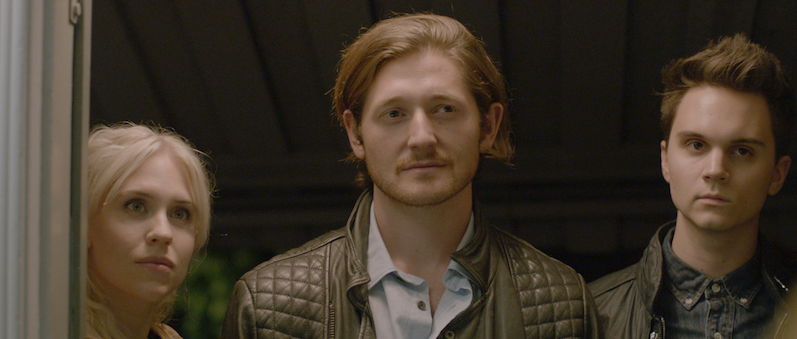
__
Thanks again to Kristin and Doug for chatting with us about I LOVE YOU BOTH! For more info on the film, visit the official website or follow the movie on Twitter, Facebook, or Instagram.
If you’re an independent filmmaker or know of an independent film-related topic we should write about, email blogadmin@sagindie.org for consideration.
